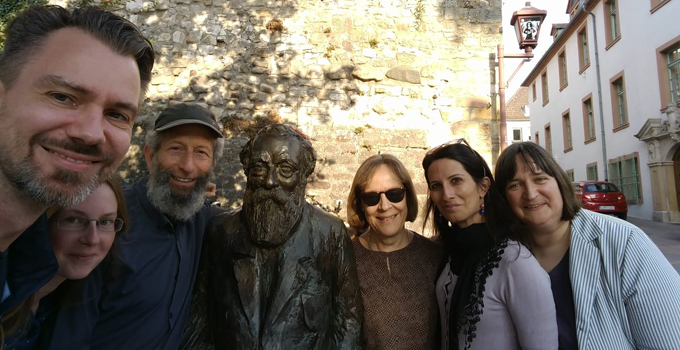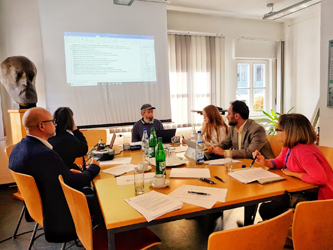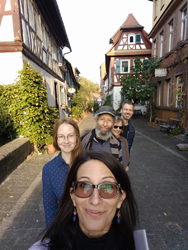The IAF was established by the ICCJ to facilitate trilateral cooperation and dialogue between Jews, Christians and Muslims through the auspices and network of the ICCJ and, when appropriate, outside that framework. The steering committee members are drawn from a broad representation of the three Abrahamic faith traditions and come from Europe (Italy, Germany), the USA, Iran and Southeast Asia (Singapore).
 |
The IAF Steering Committee: (f.l.t.r.) Heidi Hadsell (USA), Elena Dini (Italy), Frederek Musall (Germany), Morteza Rezazadeh (Iran), Reuven Firestone (USA) [missing: Mohammad Hannan Hassan (Singapore)] |
Not surprisingly, the IAF Steering Committee is a microcosm of dialogue between the Abrahamic faith traditions. Its members are (in alphabetical order):
- Elena Dini, Russell Berrie alumna at the Pontifical University of St. Thomas Aquinas in Rome and currently fellow at the Pontifical Gregorian University in Rome,
- Rabbi Professor Dr Reuven Firestone, Regenstein Professor in Medieval Judaism and Islam at the Hebrew Union College in Los Angeles,
- Professor Dr Heidi Hadsel, President Emeritus of the Hartford Seminary, a non-denominational theological college in Hartford, Connecticut, and an expert in Christian ethics,
- Dr Mohammad Hannan Hassan, an expert in Islamic legal thought and Director for Capacity Building and Interfaith Engagement and Vice-Dean of the Muis Academy in Singapore,
- Professor Dr Frederek Musall, Chair for Jewish Philosophy and Intellectual History at the Heidelberg Center for Jewish Studies (Hochschule für Jüdische Studien Heidelberg), and
- Imam Morteza Rezazadeh, PhD candidate in Comparative Study of Religions and Mysticism at Ferdowsi University of Mashhad, Iran.
In Heppenheim the IAF steering committee was welcomed by ICCJ General Secretary Anette Adelmann who also attended the sessions as ICCJ-liaison, and the group was joined by two guests: Sarah Egger, former director of ICCJ’s Austrian member organization, and Mehmet Senel, a staff member of the Institute for Islamic Studies at the University of Frankfurt, Germany.
The Heppenheim meeting was the second time that the new Steering Committee has been together since its formation last spring. The first was in Budapest in June, where the IAF offered a plenary and workshop for ICCJ’s annual international conference. But the two-day retreat in Heppenheim with its extensive agenda was the first opportunity for gathering intensely to formulate policy and develop program.
The sessions centered around finalizing the IAF Mission Statement, planning out its program in interreligious engagement and education, and preparing for the upcoming 2019 ICCJ Conference in Lund, Sweden.
 |
(f.l.t.r.): Frederek Musall, Sarah Egger, Reuven Firestone, Martin Buber [in bronze], Heidi Hadsell, Elena Dini, Anette Adelmann |
Because the October meeting coincided with the meeting of the Executive and Advisory Board of the International Martin Buber Foundation, the two groups met together over lunch to share food and conversation. During a briefing after lunch the foundation’s Board offered the steering committee members the opportunity to introduce themselves and report on the goals and planning of the IAF.
 |  |
| Work and ... | ... fun of interreligious encounters |
As a next step the IAF will shortly renew and update its pages on the ICCJ website (see the tab “Abrahamic Forum”). The steering committee will continue its own dialogue and business via regular online meetings to discuss, disagree, and find common ground. Our collective experience thus far has been extraordinary as all have expressed their deep respect and love for one another.
As one of our members put it recently, “when we meet I feel like I am at home with my religious cousins from all over the world!”
Please note:
The views, opinions, and conclusions expressed by the author of this article do not necessarily represent the views of the ICCJ, its Executive Board, or its national member organizations.
